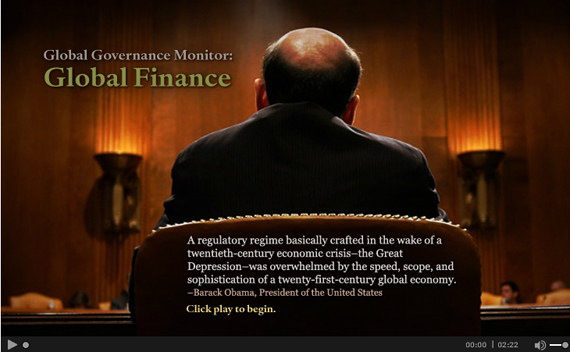Five Steps to Bolster the Global Economy
More on:

The 2007-2009 economic crisis, followed by the sovereign debt traumas in Europe, has triggered a variety of operational and institutional challenges in both global finance and economics.
With the French Riviera town of Cannes busy preparing to host leaders from around the world at Thursday’s Group of Twenty summit (G20), CFR’s International Institutions and Global Governance program is releasing the annual update to the Global Governance Monitor: Finance. This multimedia interactive tracks and analyzes multilateral efforts to manage global finance, spur economic growth, and prevent future meltdowns of the international financial system.
The package includes options for strengthening the regime in its issue brief, which outlines five actions the United States and other major economies should take in the near term. Following are a few highlights from these policy recommendations.
- Revitalize G20 action on global economic imbalances Back in April, G20 finance ministers and bank governors agreed (PDF) on a two step process to reduce persistently large imbalances between countries with current-account surpluses (notably China) and those with deficits (notably the United States). The plan also charged the International Monetary Fund with identifying factors that drive countries to accumulate massive surpluses or deficits.Leaders will evaluate these assessments at this week’s G20 Summit in Cannes, and determine action to take. Building unanimous consensus will be difficult—the risk is that national politicians will despair of a multilateral solution and will resort to unilateral sanctions, (as suggested by the U.S. Congressional proposal to punish China for currency manipulation). But unilateral measures are likely to spur retaliation and escalation. Instead, the United States and its partners must display leadership by affirmatively supporting—and giving teeth to—the G20’s “Mutual Assessment Process,” designed to identify those sovereign policy decisions that might put global economic recovery or financial stability at risk. Both China and the United States recognize that it is in their own interest to address persistent imbalances, so an international understanding about benchmarks of progress should not be impossible.
- Stemming liquidity crises The United States should support France’s proposal to bolster the IMF’s role in helping countries respond to liquidity crises. Stronger IMF responses would decrease the motivation for vulnerable countries to stockpile excessive reserves as a precaution in case of a sudden capital outflow. An increasing number of emerging economies are practicing precautionary reserve accumulation—which contributes to macroeconomic imbalances and mispricing of financial risks. As the U.S. dollar is the currency of stockpiled reserves, widespread reserve accumulation drives up the value of the dollar, widening the U.S. current account deficit. A larger IMF, and one that stood ready to lend rapidly and without excessive conditions, would reduce the incentive to unilateral reserve accumulation: collective insurance would displace individual insurance.
- Implement IMF governance reform Leaders at the 2010 G20 Seoul summit agreed to increase the voting shares of emerging economies at the International Monetary Fund (IMF) by six percent, and give more seats to developing countries on the IMF Executive Board. The IMF board of governors agreed to these reforms in December 2010, but the timeframe for actual implementation is slated for October 2012. Countries should ratify the changes in their domestic processes, to ensure a smooth and quick adoption of the proposed reforms by the 2012 deadline.An additional challenge will be negotiations within Europe to decide which European nations will give up seats on the executive board to allow for emerging economies. The United States needs to continue to pressure its partners in the G20—especially those European countries hesitant to acquiesce—toward implementing these reforms. The reallocation of quota shares and board seats should reinforce the sense of ownership that emerging countries feel toward the IMF. That, in turn, should encourage them to have faith in the IMF’s ability to provide liquidity in a crisis, and should dampen the temptation to unilateral reserve accumulation.
- Resolving the European debt crisis Resolving the European debt crisis will be important for curbing fears of contagion across the eurozone and reinvigorating a sustainable global economic recovery. Greater leadership from Germany and France is required to ensure the survival of the union, notably through increased steps toward fiscal and political unity. Since early 2010, when Greece received its first bailout package, the lack of coordination within the eurozone has resulted in a series of policy shifts that have damaged market confidence. Europe’s leaders first said private debt would not be restructured, then said Greece’s creditors should accept a twenty-one percent reduction in the value of their loans, and then settled on a fifty percent reduction for private investors last week. One possible upshot will be that Europe acquires new regional institutions, including centralized financial regulation for the eurozone and some version of an enhanced bailout fund with adequate funding. Last Wednesday’s deal on the European Financial Stability Fund (EFSF) was a first step, but the source of increased resources the EFSF remains undecided and its proposed size is inadequate to bail out any of Europe’s larger economies.
- Improve regulatory standards to mitigate financial risks Experts and policymakers have placed much of the blame for the financial crisis on weak regulatory standards and inadequate supervision of sophisticated financial activities. Although progress has been made, particularly through the creation of the Financial Stability Oversight Council in the United States and the European Systemic Risk Board in Europe, the complexity and integrated nature of modern finance continues to pose unprecedented challenges. Responding to the crisis, the Financial Stability Board (FSB), formerly the Financial Stability Forum, has provided (PDF) a set of proposals to “restore confidence in the soundness of markets and institutions.” However, FSB recommendations remain advisory, and have no legally binding enforcement mechanism, and the institution itself remains woefully under-resourced. In the absence of a strong global regime governing systemically important financial institutions, the international financial system remains vulnerable to excessive risk-taking and regulatory arbitrage.
More on:
 Online Store
Online Store
